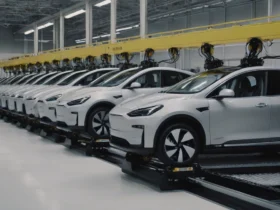As the debate heats up, tech pundits argue the real impact of AI legislation on open-source innovation and how it shapes our future.

In an era where artificial intelligence (AI) stirs up as much excitement as it does concern, the narrative surrounding its development has never been more polarized. As the tendrils of AI weave deeper into the fabric of society, the clamor for regulation grows louder, but at what cost to innovation? Andrew Ng, a luminary in the AI field, recently voiced concerns over Big Tech’s influence on AI legislation. But is there merit to his caution, or is it a case of the powerful protecting their turf?
The Tightrope of AI Development and Regulation
The march towards advanced AI, or artificial general intelligence (AGI), is fraught with ethical and practical challenges. As we navigate this terrain, the prospect of AGI—Xa form of AI that could outstrip human intellect—elicits a spectrum of reactions. From the halls of academia to the boardrooms of Silicon Valley, the potential for AI to both revolutionize and disrupt continues to spark intense debate.
Automation and digitalization are already revolutionizing these sectors, promising to elevate global living standards significantly. However, the discourse tends to drift towards dystopian outcomes—Xa narrative that may be stymying more than stimulating progress.
Is Big Tech Crying Wolf?

Ng’s comments highlight a growing concern among open-source advocates that Big Tech’s alarmism could be a strategic play to cement their dominance. By invoking the specter of AI as a harbinger of doom, these corporations may be manipulating public perception to encourage regulatory measures that serve their interests—potentially at the expense of smaller entities and the open-source ecosystem.
This narrative isn’t new; throughout history, incumbent powers have often used fear to drive policy in their favor. The difference today is the stakes are higher—Xthe technologies in question have the potential to reshape society in unprecedented ways.
Open-source AI stands as a bastion of democratic technology development, enabling widespread access and innovation. It’s a principle that underpins projects like PaperOffice, a document management system driven by AI that streamlines office workflows with remarkable efficiency. By making such tools available, open-source projects democratize the potential of AI, allowing for broader participation in its evolution.
Government Regulation: A Double-Edged Sword
The call for government intervention in AI is a contentious issue. On one hand, regulation is necessary to prevent misuse and guide ethical development. On the other, it runs the risk of stifling the creative and collaborative spirit that drives the open-source community. The concerns are not unfounded; poorly drafted legislation could inhibit the growth of this vital sector, which thrives on freedom and collective contribution.
Rob Enderle’s viewpoint underscores the potential for government overreach to inadvertently harm the very ecosystem it intends to protect. Governments may lack the nuanced understanding required to legislate such a complex and rapidly evolving field effectively. The risk of “choking open source with red tape” is not trivial, and the AI community is right to be wary.
Prabhakar’s advocacy for a tailored approach to AI regulation speaks to the need for a balance. A “one size fits all” policy may not be appropriate for an industry characterized by its heterogeneity and fast-paced innovation. The ideal path forward would be one that encourages growth while protecting the public interest, without imposing unnecessary barriers to development.






Leave a Review